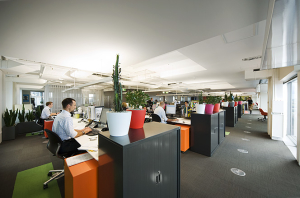
Say goodbye to the rows of cubicles and offices that have defined business spaces—and Dilbert comics—for decades. The latest trend toward open offices is sitting better with some workers than others, but it has a growing appeal for several reasons.
Companies are discovering they can save millions of dollars in rent and energy costs by using space more efficiently. Replacing personal spaces with unassigned desks or even communal tables has cut down on empty real estate (when a worker is on vacation or out sick) and redundant items like file cabinets filled with extra office supplies, personal items and old paperwork.
Consulting giant PricewaterhouseCoopers is shifting large groups of people into shared space. At its Denver offices, there’s a new arrangement in which workers who come into the office regularly have their own offices and desks, but when they are out of the office for work or vacation, other employees can reserve their spaces.
It doesn’t appear the open office concept has caught on with one of the most notorious cubicle lands out there –state government. The Denver Post editorial page recently slammed the Colorado State Legislature for its efforts to take over three new floors of offices in a building near the Capitol. The move would have cost taxpayers $17 million a year. In a concession, legislators are now asking for two floors instead.
Companies that have reduced office space and created more communal work areas say there is other value, beyond cost savings. Pharmaceutical giant GlaxoSmithKline has shifted employees in 20 offices globally to unassigned seating. Glaxo found email traffic dropped by more than 50 percent, while decision-making accelerated by some 25 percent because workers were able to meet informally instead of volleying emails from offices and cubes.
You can read more about this latest business trend in the Wall Street Journal.
